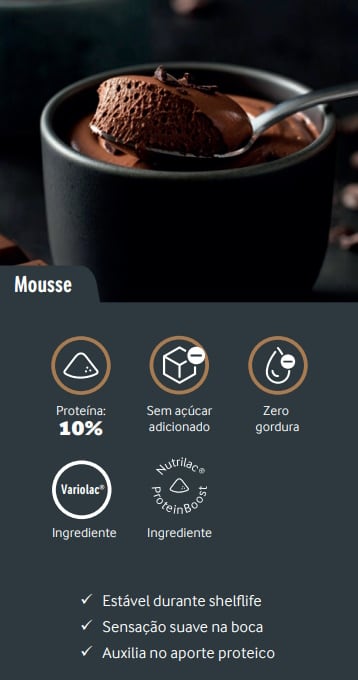As health-conscious consumers seek sustainable and functional food options, protein-rich alternatives are taking centrestage.
With the plant-based market evolving and egg prices soaring due to Avian flu and the popularity of GLP-1 weight loss drugs, plant and yeast-based proteins provide allergen-friendly, cost-effective solutions.
Also read → Eggflation, GLP-1 and the blame game: How politics and demand are scrambling the bakery industryConsumers may be focusing on health, but they still crave rich flavors and satisfying textures. This demand is driving innovation in desserts and ingredient solutions worldwide, demonstrating that nutrition and enjoyment can go hand in hand.
In Latin America, high-protein treats are becoming increasingly popular, while in Europe, yeast-based proteins are transforming the alternative protein market. These advancements highlight a broader movement toward functional foods that seamlessly blend taste and wellbeing.

Latin American food manufacturers are responding to shifting consumer preferences with a new wave of high-protein desserts that deliver both luxury and nutrition.
The region accounted for 10% of global dessert launches in 2024, with retail sales reaching $12.7 billion (Innova Market Insights). Brazil’s dessert market is growing at 9% CAGR, yet 8% of LATAM consumers have reduced dessert consumption due to health concerns. However, 79% wish for healthier indulgent options, driving a surge in reformulating products to include functional ingredients like protein, rather than just cutting sugar and fat.
A key player in this movement, Arla Foods, has introduced a comprehensive toolkit featuring 12 dessert recipes tailored for the LATAM market. These recipes are rich in whey protein and therefore branched-chain amino acids, which means they support muscle repair and growth while delivering a creamier texture, even in low-fat formulations. They also enhance shelf life and stability in fruity desserts, ice cream and sorbet.
“As elsewhere, desserts consumers in South America are increasingly health-conscious,” said Ignacio Esteves, application manager, South America. “However, that doesn’t mean they wan to give up indulgence or that they only want options with reduced sugar or fat. They’re increasingly aware of the many benefits of high-quality protein and they want to see it in their favourite products ‐ especially if it gives them permission to indulge.”

While Latin America is embracing high-protein desserts, European consumers are turning to yeast proteins as an alternative to eggs and synthetic texturizers. A recent consumer study in France, Germany and the UK by Netherlands-based foodtech innovator Revyve highlights growing enthusiasm for yeast-based proteins due to their nutritional benefits, versatility and sustainability.
In France, where culinary traditional emphasize texture and flavour, consumers appreciate yeast protein’s ability to mimic eggs' thickening and softening properties while maintaining traditional taste profiles. British and German consumers, on the other hand, express concerns about cholesterol and the non-vegan status of eggs, making them more open to animal-free alternatives. Germans, in particular, value transparency and the environmental impact of ingredients.
Revyve is capitalising on these preferences by offering upcycled brewer’s and baker’s yeast proteins, which replace eggs in sweet and savoury applications while enchancing nutritional value with protein, fibre and B vitamins. They also confer clean label appeal (created through a proprietary minimal processing technique) and by utilising side-streams from the beer brewing and sugar industries, promote sustainability.
According to Revyve’s consumer study, sustainability is a major driver of innovation in the European market. Consumers in the UK resonate with the concept of ‘upcycling’, while German consumers are more familiar with terms like ‘circular economy’ and ‘re-use’. Across all surveyed groups, there is strong appreciation for sustainable protein alternatives that reduce environmental impact, support animal welfare and minimise food waste.
“This survey reveals three types of consumers,” said Dr Corjan van den Berg, cofounder and chief growth officer. “The French consumer treasures the dining experience and demands dishes be crafted from fresh, natural ingredients. The modern UK consumer seeks convenience to meet its fast-paced lifestyle while prioritising ethically sourced plant-based options. Meanwhile, the German consumer is practical, opting for hearty, sustainably sourced meals that balance nutrition with satisfying substance. Understanding the cultural nuances that influence consumer choices is key to tailoring our products with precision to effectively meet their individual needs.”

As the global food landscape evolves, consumers are demanding more from their favourite indulgences.
By harnessing advanced ingredient technologies and sustainable practices, manufacturers are meeting consumer demands while transforming the landscape of nutritious enjoyment. Whether through high-protein desserts or yeast-based egg alternatives, the next wave of food innovation is redefining what it means to indulge responsibly.











:max_bytes(150000):strip_icc()/ms-sorrel-leaves-getty-ee81d3b9ab5045f0aa8dc078972127be.jpg)